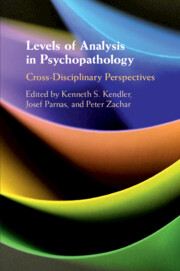Book contents
- Levels of Analysis in Psychopathology
- Advance Praise for Levels of Analysis in Psychopathology
- Levels of Analysis in Psychopathology
- Copyright page
- Contents
- Figures
- Tables
- Contributors
- Preface
- General Introduction
- Part I Neuroscience, Mechanisms, and RDoC
- Part II Phenomenology, Biological Psychology, and the Mind–Body Problem
- Part III Taxonomy, Integration, and Multiple Levels of Explanation
- Index
- References
28 - Introduction
from Section 10
Published online by Cambridge University Press: 02 April 2020
- Levels of Analysis in Psychopathology
- Advance Praise for Levels of Analysis in Psychopathology
- Levels of Analysis in Psychopathology
- Copyright page
- Contents
- Figures
- Tables
- Contributors
- Preface
- General Introduction
- Part I Neuroscience, Mechanisms, and RDoC
- Part II Phenomenology, Biological Psychology, and the Mind–Body Problem
- Part III Taxonomy, Integration, and Multiple Levels of Explanation
- Index
- References
Summary
Several chapters in this volume address the heterogeneity problem in psychiatric classification, i.e., that constructs such as major depressive disorder and generalized anxiety disorder have turned out to be too coarse-grained to support the discovery of underlying mechanisms or to guide clinicians in selecting disorder-specific treatments (Bilder Chapter 5, Miller Chapter 20, although see Bechtel Chapter 2 for a different view on mechanisms and heterogeneity). Bringing a more statistical perspective to the heterogeneity issue, Jan-Willem Romeijn and Hanna M. van Loo refer to this as the reference class problem.
Information
- Type
- Chapter
- Information
- Levels of Analysis in PsychopathologyCross-Disciplinary Perspectives, pp. 345 - 348Publisher: Cambridge University PressPrint publication year: 2020
